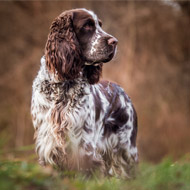Scotland introduces ‘mixed bag’ of animal welfare measures

The measures include new legislation permitting vets to shorten the tails of spaniels and hunt point retrievers.
The Scottish government has introduced a package of measures designed to improve animal welfare, together with a bill to ban the use of wild animals in travelling circuses.
The measures include new legislation permitting vets to shorten the tails of spaniels and hunt point retrievers - intended for use as working dogs - to reduce the number of tail injuries.
“We commend the Scottish Government on seizing the opportunity to improve animal welfare through the introduction of a Bill to ban the use of wild animals in travelling circuses," commented BVA Scottish Branch president Grace Webster.
“While the use of wild animals in travelling circuses may not affect a great number of individual animals, it is emblematic of the way we treat all animals and we would urge the rest of the UK to follow this precedent, introduced on ethical grounds.
“However, this package of measures seems a bit of a mixed bag," she continued. "Until recently Scotland also led the way on dog welfare with a complete ban on tail docking, so we are extremely disappointed at the decision to reverse this stance.
“We have carefully considered all the evidence and remain convinced that tail docking in dogs, even specific breeds, is detrimental to their welfare. This is a retrograde step for animal welfare in Scotland, amidst an otherwise progressive package of animal welfare measures.”
Later this month, the BVA Scottish Branch will give evidence in Scottish Parliament ahead of a vote on whether to approve the law relating to tail docking.
Setting out the measures on Thursday (11 May), environment secretary Roseanna Cunningham also confirmed that Scotland will restrict the use of electronic training collars and commit to updating regulations to combat irresponsible breeding.
“Animal welfare starts right at the beginning of a pet’s life, so the focus on pet licensing and breeding regulations is welcome," added BVA president Gudrun Ravetz.
“Yet we are saddened at the shortfall on legislation around aversive training aids for dogs, which we expect will still permit the use of training collars under expert guidance. We know using fear as a training tool is not only less effective than positive reinforcement but can take its toll on a dog’s overall welfare. Without an outright ban, we have grave concerns over how enforceability will work.
"This raft of measures seems to give with one hand and take away with the other.”



 The Veterinary Medicines Directorate (VMD) is inviting applications from veterinary students to attend a one-week extramural studies (EMS) placement in July 2026.
The Veterinary Medicines Directorate (VMD) is inviting applications from veterinary students to attend a one-week extramural studies (EMS) placement in July 2026.